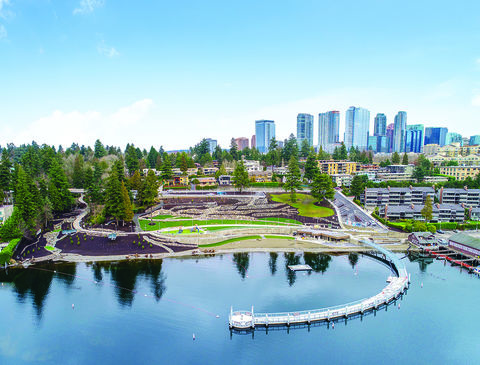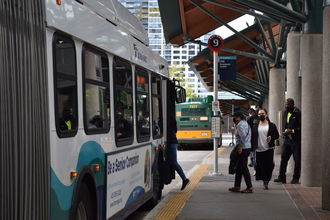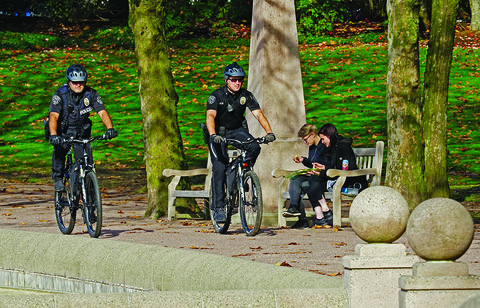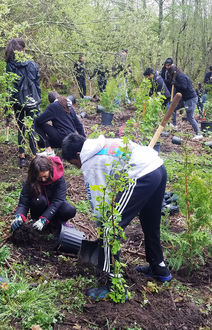Bellevue's Vision of the Future
Bellevue is a special place in the Puget Sound region. We have a diverse and engaged resident community, talented workforce, strong schools, beautiful neighborhoods, stunning natural beauty and a transportation system that offers a variety of safe travel options. Bellevue’s high quality of life has attracted some of our nation’s most innovative and successful companies. We have worked with residents and employers to ensure that Bellevue maintains its character while attracting new jobs.
As a result of years of planning, community engagement and active participation by Bellevue’s residents, our local economy has thrived. We have created thousands of jobs that support local families, local businesses, arts, schools and services. There is more to come — 70,000 jobs and 35,000 housing units could be added by 2044 — but we are ready.
Planning and partnership is how Bellevue manages growth; it’s also how we manage the unexpected. As we responded to the challenges of COVID-19, we worked with local employers to provide stability and resilience and maintain a safe, vibrant community that is welcoming to all.
Transportation
When we welcome new employers, we also plan for how additional employees will move around the city.
Building Capacity
We partner with the business community to ensure all Bellevue residents benefit from job growth. Developers pay transportation impact fees to the city to help support projects such as an extension of Northeast Fourth Street, widening of 120th Avenue Northeast and the new Northeast Spring Boulevard in BelRed. These fees make a meaningful contribution; one large building can add as much as $6 million for local transportation projects.
The City Council continues to invest in projects valued by residents, and the city’s Capital Investment Program supports multimodal transportation solutions that are safe and efficient for everyone: people who drive, bicycle, walk, roll, carpool and take transit. To help improve capacity for all modes between downtown and the rapidly growing BelRed area, Bellevue prioritized new construction with a $100 million federal loan.
Moving people in smarter ways
Sound Transit’s East Link light rail will significantly expand our ability to travel to downtown Bellevue without a car. Starting in 2024, the 2 Line, along with transit improvements such as increased bus and shuttle service, will lessen the burden on downtown streets.
Employers also work directly with their employees to develop smart commuting options and Bellevue is partnering with companies and other organizations to reduce the number of drive-alone trips. From 2016 to 2020, about 71% of Bellevue workers drove alone to their jobsite, according to the U.S. Census American Community Survey’s five-year estimate; the target number is 60% by 2035.
Local Jobs and Economic Development
A strong employer base provides economic resiliency to a city, whether it’s a time of crisis or growth. Many of our neighbors have suffered job losses and insecurity in recent years. Our economic development efforts will help Bellevue families recover with new opportunities that support our stable and diverse tax base. Revenue from sales, commercial real estate, corporate property, and transient occupancy taxes all help support city services, schools and cultural institutions.
We also work with employers and schools to ensure local young people and mid-career workers can access these high-skill jobs though pathways such as technical training programs, internships and apprenticeships.
A Safe Bellevue for All
Bellevue is one of the safest and most diverse cities in Washington, and we are committed to ensuring everyone can thrive. According to the 2021 Performance Measures Survey, over 95% of residents feel safe in their neighborhoods. The city has renewed its commitment to enriching the quality of life for all residents by promoting access, equity, inclusion and opportunity. That includes a recent study of the police department’s practices and policies, including for use of force, and recommendations for changes now being researched or implemented.
In addition, the department is studying:
- a plan for Light rail safety
- a Community Crisis Assistance Team for individuals in crisis
- body cameras
- Multi-modal Capacity
Learn more about the City's commitment to in the Council's Public Safety Review.
Building on Our Success
Over recent decades, Bellevue's growth has been inline with planning projections. this has allowed us to continuously improve our services and infrastructure while fine-tuning our approach.
-
1980s
- Early 1980s
- Initial rezoning of Downtown
-
1990s
- 1990
- First year Bellevue had more jobs than residents
-
2000s
- 2004
- Downtown Implementation Plan
- 2009
- New BelRed Plan and Code
-
2010s
- 2016
- Neighborhood Safety, Connectivity and Congestion Levy
- 2017
- Eastgate Code Amendments
- 2017
- Downtown Livability Code Amendments
- 2018
- Grand Connection Vision Established
- 2018
- All police positions funded and staffed
-
2020s
- 2021
- Launch Periodic Comprehensive Plan Update
- 2024
- Light rail 2 Line Opens
-
2030s
- 2035
- 18,000 more downtown jobs forecasted
Environment
Since its incorporation in 1953, Bellevue has remained committed to preserving residential neighborhoods and providing a robust park system. Focusing our commercial growth into a dense downtown core promotes both livability and environmental goals.
Adding density downtown and in the growing BelRed area helps us build vertically instead of sprawling out. In the early 1980s, the City Council adopted code changes that allowed for building up the downtown core, with the height of buildings decreasing closer to surrounding neighborhoods. Our downtown density plan requires good urban design, maintains a pedestrian-friendly environment and incentivizes green building techniques.
Stewardship is a core value for the city. With the Sustainable Bellevue: Environmental Stewardship Plan, we commit to act boldly to ensure Bellevue
is a healthy, livable, sustainable and prosperous “City in a Park” for decades to come.
It’s not enough to just preserve parks and open space — we can enhance it for future generations. In the next few years, Bellevue residents will see:
- New neighborhood parks at Newport Hills and Bridle Trails
- Expansion of the Mountains to Sound Greenway and Eastrail, both regional trails that run through Bellevue
Discover more about the city's environmental priorities and goals at our Environmental Stewardship program.
Housing
Having enough housing for all income levels is a regional challenge since our population is growing faster than our housing stock. The city is investing in affordable housing options and is committed to creating a range of choices. Bellevue is making it easier to build more affordable and market-rate housing through zoning changes and development incentives, plus funding to maintain existing units and build new ones.
Since the adoption of the Affordable Housing Plan in 2017, Bellevue has created or preserved approximately 1,500 affordable housing units or shelter beds. About 700 additional housing units are expected to come online over the next couple of years. The city also invests in and advocates for multiple transportation options to better connect workers living outside the city limits.
Community that Cares
Homelessness is a systemic problem that touches every major American city. Too often, families are catapulted into homelessness with a single incident, such as a health issue, the loss of a job, or the need to escape domestic violence. The city’s Human Services staff work with nonprofits, businesses and government agencies to care for children, families and individuals, and to help stabilize their lives. The city council has approved $3.6 million for development of a permanent men’s shelter in Eastgate; it is on track to be completed in 2023.
Our community’s older residents in need can access a variety of assistance programs, including utility payments, food banks, home repair services, healthcare support and more.
Moving Forward
Bellevue's fundamentals - a vibrant downtown, beautiful neighborhoods, economic opportunity, with high-quality schools, parks, art and culture - are being enhanced by some of the nation's most innovative and essential companies. Learn more about how Bellevue is growing:




